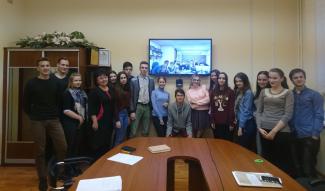“I believe that each professional needs to apply the best experience of those who are successful in their respective fields," noted Galina Bedulina, an associate professor of the Department of Economic Sociology at the Belarusian State Economic University in Minsk. "My American colleagues inspired me to create effective educational programs to develop the entrepreneurship skills of students at Belarusian educational institutions.”
With the desire to weave entrepreneurial training into Belarusian secondary schools, Galina applied for USAID’s Community Connections program to learn best practices from American educators for developing entrepreneurship skills among school children. USAID's Community Connections program empowers approximately 60 participants a year to adapt lessons in leadership and entrepreneurship to tackle social and economic development challenges in Belarus.
Galina was chosen and participated in the 2017 Community Connections program on Entrepreneurship Education for School Children. By being exposed to various U.S. educational models, Galina saw how she could encourage entrepreneurism and innovation in Belarusian schools through both formal and informal approaches.
During her visit to the United States, Galina reached an agreement with Laura Kline, PhD, Director of Global Studies at Wayne State University in Detroit, Michigan, to carry out joint Skype seminars for Belarusian and American students. During these seminars students shared their experiences on the cultural, educational, and professional peculiarities and differences between the two countries.
Inspired by her visit to Michigan’s Macomb Intermediate School, Galina developed a creative and hands-on way to teach students about entrepreneurship by having them come up with their own businesses and manage them. The program is called “Mini-Society” and is based on the American model of the same name. The project was designed to develop pupils' entrepreneurship and financial skills by having them create a business, manage a budget, and make decisions on how to responsibly spend their money. Galina promoted the project to her colleagues in Belarus after her return from the United States, which led to Belarus’ Mosty Public School piloting it in 2018. After the model’s successful implementation in Mosty Public School, the project caught on with other schools in the Minsk region, who piloted their own “Mini-Society” programs.
While on her Community Connections visit to the United States, Galina also learned about 4-H, an American organization with the mission of engaging youth through experiential learning focused on citizenship, leadership, responsibility, and life skills. Inspired by 4-H’s youth development approach and with the support of the U.S. Embassy Alumni Grants Program, Galina launched a project to introduce and adapt American best practices in teaching entrepreneurship through a 4-H seasonal school for 25 innovative teachers in 13 rural innovation schools in four regions of Belarus. Since many Belarusian teachers in rural areas lack the skills needed to teach the basics of entrepreneurship, Galina’s project provides teachers with a toolbox of new approaches based on the 4-H model. Since its launch in 2018, the project’s seminars have generated discussions on how universities and secondary schools can collaborate to positively shape the entrepreneurial competencies of Belarusian schoolchildren using elements of the 4-H program.
Today the 4-H model is growing in popularity among Belarus' rural schools thanks to Galina's vision and dedication to seeing it through. Since USAID initiated its Community Connections program in 2006, over 700 Belarusian professionals have visited various U.S. communities and been exposed to American best practices and culture.

